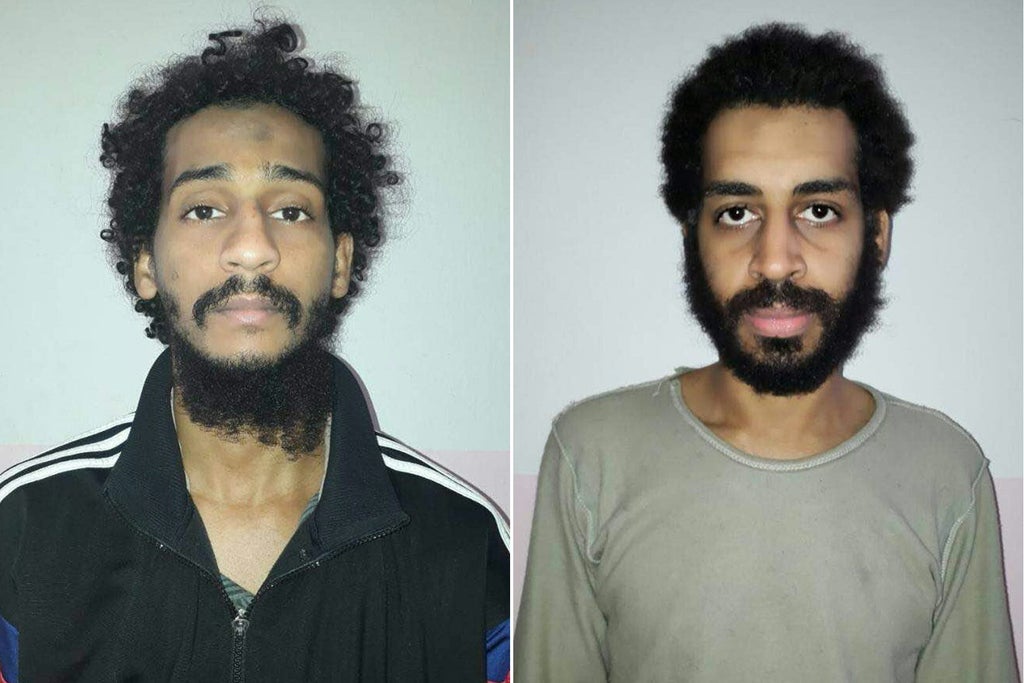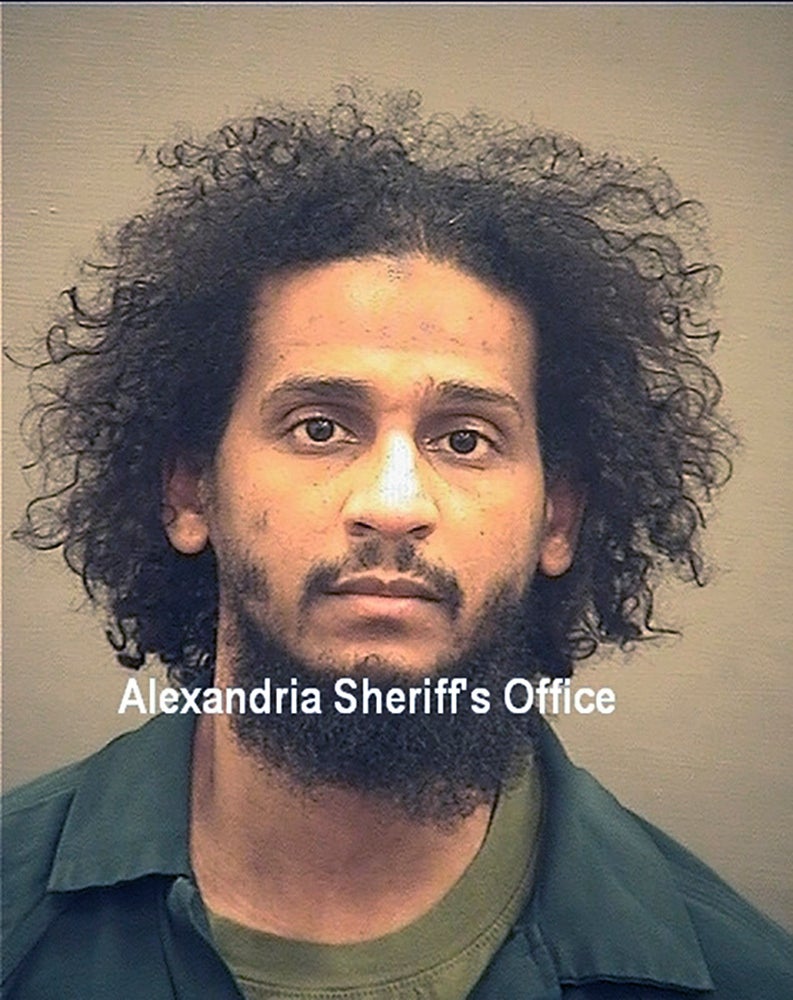
Lawyers for El Shafee Elsheikh, a British jihadist on trial in a US federal court for his role in the kidnap and murder of four Americans while he was a member of Isis, denied that he was a member of the infamous ‘Beatles’ terror cell and claimed a case of mistaken identity at the start of his trial.
During opening statements of the trial in Alexandria, Virginia, Edward MacMahon described his client as a “simple Isis soldier,” and claimed the evidence would show that Elsheikh was not a member of the so-called Isis ‘Beatles,’ a name given to a group of four British Isis fighters by Western hostages.
Mr MacMahon said the evidence presented by the prosecution would be “beyond heartbreaking and horrific,” but claimed that it “will fail to prove that he is a member of the Beatles, or that he was involved in the kidnapping and killing” of four Americans.
Elsheikh, 33, is accused of being part of a cell that operated a vast hostage extortion scheme, one which ultimately led to the brutal killing of journalists James Foley and Steven Sotloff, and aid workers Kayla Mueller and Peter Kassig. The indictment also holds him responsible for the deaths of British aid workers David Haines and Alan Henning.
The court heard that Elsheikh formed a cell that became known as the ‘Beatles’ with alleged co-conspirators Alexanda Kotey and Mohammed Emwazi —an Isis executioner known by his nickname ‘Jihadi John’. The group is accused of being involved in more than 20 kidnappings between 2012 and 2015.
Elshiekh is the most high-profile Isis member to face a trial, and the proceedings may shed some light on the inner workings of the terror group. It is expected to last for four weeks and the jury will hear testimony from more than 30 witnesses — some of them former captives of the group.
Elsheikh wore a blue striped shirt and glasses in the courtroom. His beard was grown long and his hair cut short and gelled at the top. He occasionally took notes during proceedings but did not turn to look back at the court. The parents of all four American victims sat a few feet away behind him, often comforting each other when details of their childrens’ captivity were read or shown on screen.
In the opening statement for the prosecution, lawyer John Gibbs said the evidence would show Elsheikh was a key member in a widespread hostage-taking scheme run by Isis. He said they would present witnesses who would identify Elsheikh as a member of the ‘Beatles,’ who were jailers for those hostages, as well as their torturers.
Mr Gibbs said that Elsheikh went to Syria “not as an aid worker or a journalist,” like his victims, “but as a fighter.” After travelling to Syria in 2013 he joined an Al Qaeda affiliate, before eventually swearing allegiance to Isis and fighting in at least one battle, he said.
The court heard that Elsheikh, Kotey, and Emwazi all fought together as Isis members to capture the Syrian city of Raqqa from the Syrian army, after which Elsheikh sent gruesome images of beheaded Syrian soldiers to his brother via the Telegram messaging app.
The group would later become jailers for Isis, keeping watch over Western hostages and handling ransom demands, the prosecution alleged. Mr Gibbs said they shared a “common purpose in the detention and mistreatment” of those hostages.
Some hostages who were later released would testify that the group seemed to “enjoy and take satisfaction” in the physical abuse of detainees under their watch, Mr Gibbs said. They were described as “utterly terrifying,” he added, and would regularly beat them for no reason with kicks, punches and clubs. The abuse was described as “unrelenting and unpredictable,” and included stress positions, waterboarding and threats of murder.
Mr Gibbs said that Elsheikh’s own words would be presented as evidence against him — statements he made in interviews with the FBI, Department of Defense and in numerous media interviews given following his capture by Kurdish-led forces in Syria in 2018.
In those media interviews, Elsheikh admitted to being an Isis fighter and overseeing Western hostages, and that he was responsible for collecting email addresses from them in order to issue ransom demands. He also admitted to beating prisoners and being present when a Syrian hostage was shot dead in front of other detainees. Mr Gibbs said the jury would see correspondence between Isis captors and the families of the hostages, in which they made gruesome threats and demands for millions of dollars.
Mr MacMahon, for the defence, said his client made statements during his captivity because he feared for his life, and that the evidence of what he told journalists would be shown to be inconsistent. He also noted witnesses said the British speakers who tormented them were careful to always wear masks, making identification difficult.

Elsheikh was born in Sudan and grew up in Shepherd’s Bush, London. He went to Syria in 2012, at which point he joined an affiliate of Al Qaeda. Later, he and his friend Alexanda Kotey would swear allegiance to Isis and join up with Emwazi and Davis.
Emwazi was perhaps the most infamous of the group, and thought to be the ringleader. Known as ‘Jihadi John,’ he carried out the beheadings of Foley, Sotloff, and British citizens David Haines and Alan Henning — acts which Isis filmed and released in propaganda videos.
Elsheikh and Kotey were captured by the Kurdish-led Syrian Democratic Forces in 2018 as they fled the former Isis capital of Raqqa dressed as civilians. They were held in Syria until October 2020, when they were eventually taken to the US to stand trial.
Kotey pled guilty in September 2021 to the murders of Foley, Sotloff, Meuller and Kassig, and is due to be sentenced next month. Emwazi was killed in a drone strike in 2015. Aine Lesley Davis, the fourth member of the group, was convicted in Turkey on terrorism charges and jailed for seven and half years in 2017.
The court heard that when Elsheikh was first captured, he pretended to be a Yemeni who could not speak English. When officers with the US Department of Defence used biometric data to identify him, he came clean and started to speak English.
Following opening statements, the prosecution presented testimony from Bruce Hoffman, an Isis expert and senior fellow for counterterrorism and homeland security at the Council on Foreign Relations. Mr Hoffman gave a broad overview of the worst crimes carried out by Isis, from its treatment of prisoners to the mass enslavement of Yazidi women.
The prosecution played excerpts from Isis propaganda videos, including some that showed James Foley, David Haines and Alan Henning before their deaths. In those moments, their families turned to comfort each other in the courtroom.







